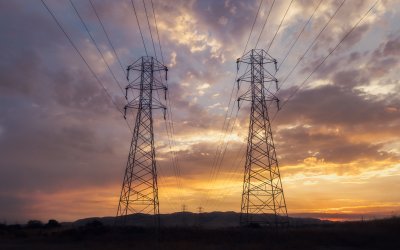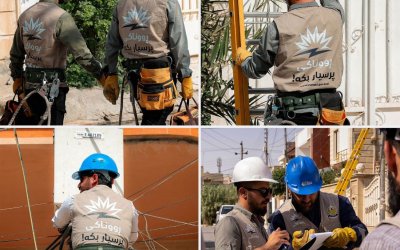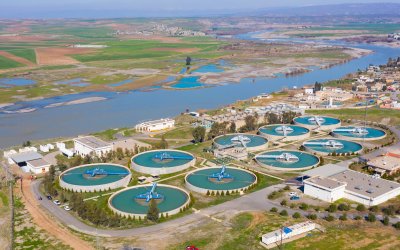Climate change will increasingly pose a threat to water access across the Middle East, and Iraq may witness these impacts faster than some other countries in the region. But the disastrous water situation already befalling Iraq’s southern areas is not primarily due to climate change, at least not yet. Iraq’s problems with water scarcity and water pollution are the product of two significant trends: First, upstream damming in Turkey and Iran has dramatically reduced water supply entering Iraq in recent decades. Successive Iraqi diplomatic delegations have yet to negotiate a sustainable and long-term agreement.[1] Second, poor water governance and enforcement within Iraq, especially between 2003 and the present, has led to disproportionately high losses of water as well as contamination across the system. The political turmoil and insecurity that ensued after the US-led invasion left Iraq’s water infrastructures and regulatory mechanisms underprioritized and dysfunctional.[2] Industrial polluters contaminating the country's water supply go unpunished, while large-scale construction projects dig wells outside state approved limits.[3] Meanwhile, water piping networks, drainage systems, and sewage treatment facilities are poorly maintained and often entirely inoperable.[4] Prime Minister Mohammed Shia al Sudani has repeatedly emphasized the importance of Iraq’s environment and water resources, but it remains to be seen whether these statements will be realized both in policy and budgetary priorities.[5]
Building upon the efforts of the already emerging new generation of environmental activists in Iraq, IRIS has piloted the “Youth for Accountability in Environmental Governance” (YAEG) program in order to bring together young leaders who are committed to holding the Iraqi government accountable to make meaningful progress towards preserving water resources, reducing water pollution, and improving environmental governance generally. On Jan. 26-27, 2024, 20 young leaders from 11 provinces across Iraq convened in Sulaymaniyah for the first of two YAEG workshops with expert trainers from government and academia. The aim of the first workshop was to provide the participants with an introduction to the role of the Iraqi government in managing the country’s environmental and water resources, and to identify gaps requiring grassroots follow up and accountability. This policy brief provides an overview of the workshop’s main insights.
Understanding the complexity of environmental & water governance
One major challenge facing youth environmental activists in their efforts to hold the government accountable is the sheer complexity of the governmental system with regards to water and the environment.[6] Water allocations and water pollution are regulated and managed by numerous Government of Iraq (GoI) authorities, including the Ministry of Water Resources (MoWR), the Ministry of Environment (MoE), the Ministry of Agriculture (MoA), the Ministry of Construction, Housing, Municipalities and Public Works (MoCHMPW), in addition to provincial authorities, legislative bodies, and corresponding Kurdistan Regional Government (KRG) agencies. Each of these government entities has distinct roles and financial constraints, and these elements must be understood before one can hold them accountable for their performance. Thus, the key if not the primary goal of the YAEG program is to provide the participants with a nuanced understanding of this interagency picture. In sum, the program aims to accomplish the following:
- Equip young leaders to understand the inner workings of Iraq’s water & environmental governance system across the relevant government departments, including drivers of inefficiency.
- Equip young leaders with the skills/networks to develop bottom-up accountability mechanisms to hold water and environmental governance actors accountable.
- Generate an overall shift in the focus of environmental advocacy among youth from general climate change awareness towards bottom-up accountability for environmental governance.
The focus on Iraq’s complex environmental/water governance system (including both relevant GoI and KRG agencies) does not mean to minimize the importance of holding other key actors accountable, including domestic private sector companies, international organizations and militaries, and international oil companies; however, the Iraqi government should receive the bulk of the attention given that ultimately the state is chiefly responsible for managing and regulating Iraq’s environment, and fortunately youth environmental activists are already working with the government on a number of environmental issues in a variety of local contexts and national forums.
Main gaps in the environmental & water governance system
Poor coordination
Discussions at the YAEG workshop highlighted that the complexity of the interagency picture described above requires close coordination between different government bodies. Effective water management necessitates collaboration among various institutions involved in water governance. For example, decisions regarding water allocations in Iraq are primarily made by the MoWR, but the MoWR must consider crop needs (determined by the MoA), oil extraction demands for fresh water (Ministry of Oil), and drinking water requirements (MoCHMPW). However, relevant water management institutions at different levels of the government—federal, regional, and local—operate independently and are often reluctant to share data and cooperate on common objectives. This inter-agency incoherence is exacerbated by political incentives and dynamics.[7]
Politics plays a role in skewing interagency cooperation. As a product of post-2003 political fragmentation, key positions in influential water governance ministries such as the MoWR and the MoA have been occupied by representatives of competing political factions and parties according to an allocation logic known as “muhassasa”.[8] This political discord and dealmaking manifests itself in water management when government officials aligned with different parties refuse to collaborate and coordinate policies. As one government participant noted, the outcome is detrimental to the water sector: “When ministries are occupied by followers of competing parties under the muhassasa system, coordination becomes unlikely, ultimately affecting the water sector.”
Flagging infrastructures
The government’s role in building and maintaining water infrastructures formed a major subject of discussion during the YAEG workshop. Addressing the pervasive problem of water contamination requires maintaining, expanding, and updating the country's water infrastructure, particularly water treatment facilities. However, institutional negligence and politically motivated fund allocations have undermined these efforts. Outdated and faulty wastewater treatment facilities continue to allow for the contamination of major rivers like the Tigris, with examples such as the direct dumping of wastewater from health facilities into the river due to malfunctioning facilities and lack of alternatives.[9] The deterioration of institutional norms exacerbates the neglect of water infrastructure. Ministries and institutions responsible for water management and regulation, including the MoCHMPW, MoE, and MoP, have failed to prioritize the maintenance of water infrastructure, particularly water purification and sewage treatment facilities. The prevailing attitude among government officials towards this issue is troubling, with their focus primarily on crafting strategic documents and neglecting the urgent need for infrastructure improvements.
Weak enforcement
Political dynamics significantly impede enforcement efforts in water management, especially during periods of severe water scarcity, exacerbating the challenges faced by downstream provinces like Missan, Basra, and Dhi Qar. The reduced water levels in Iraq's Tigris and Euphrates Rivers have led to heightened social tensions in these regions. As authorities address violations of water consumption upstream to ensure equitable water distribution, they encounter formidable obstacles rooted in political alliances and patronage networks. The influence of political support for violators severely hampers enforcement initiatives. Construction projects, farmers, and tribal leaders, buoyed by political backing, defiantly resist attempts to curb violations of water consumption and well-digging, thereby exacerbating water shortages downstream. This resistance is often bolstered by entrenched patronage systems, where influential figures exploit their political connections to evade accountability for their actions.[10] Such dynamics create a vicious cycle wherein marginalized individuals and communities bear the brunt of water scarcity, while powerful interests prioritize their own economic and political gains. Moreover, the politicization of water management further complicates enforcement efforts. Decision-making processes regarding water enforcement actions are often mired in political calculations rather than objective assessments of environmental sustainability and the impact on marginalized groups. This politicization breeds distrust among stakeholders and undermines the legitimacy of regulatory measures, fostering a climate of impunity for violators. Consequently, the enforcement capacity of relevant authorities is undermined, exacerbating the already weak position of vulnerable communities.[11]
Financial constraints
The expansion of water infrastructure and the acquisition and maintenance of critical monitoring technologies and facilities are hindered by a lack of funding. YAEG participants and government representatives at the workshop lamented the scarcity of budgetary allocations across key ministries involved in water management, including the MoWR and the MoE. One participant expressed frustration, questioning the allocation of Iraq's sizable budget to priorities that have nothing to do with Iraq’s water crisis: "Anywhere you ask about the environment or water, they say we do not have budget." As a consequence of these budgetary constraints, the MoE's monitoring stations and laboratories are non-operational. Efforts to rebuild these stations, installed by a foreign company in 2012 but defunct since 2017 due to maintenance issues, face constant financial hurdles. Approval delays from the Ministry of Planning (MoP) further exacerbate these challenges, hindering the MoE's attempts to restore functionality. Similarly, plans dating back to 2008 for the construction of wastewater treatment plants in Karbala have yet to receive approval, illustrating bureaucratic inefficiencies in allocating funds for critical infrastructure projects. Even when projects are approved, they often remain unimplemented due to insufficient funding allocations.
Overall, the allocation of substantial and necessary funds to water management institutions such as the MoE, MoWR, and MoA lacks priority among Iraq's major political factions. Despite the estimated expenses of essential strategies like the Strategy for Water and Land Resources in Iraq reaching 180 billion Iraqi Dinars (IQD), the annual budget for MoWR peaked at only 1 billion IQD in 2018. A government representative in the workshop highlighted the political obstacles preventing increased funding for MoWR, stating that "there are serious political issues that prevent more budget for MoWR." In sum, financial constraints and budgetary challenges severely impede efforts to improve water management in Iraq, hindering infrastructure development, technological advancements, and water quality monitoring initiatives. Addressing these challenges requires prioritizing water management in budgetary allocations and overcoming bureaucratic hurdles to ensure adequate funding for essential projects and operations.
Role of sectoral ministries in transboundary water negotiations
The dysfunction described above not only hampers internal governance but also significantly impairs Iraq's capacity to negotiate effectively with its upstream neighbors. The Iraqi government has long grappled with securing a larger share of water from neighboring Turkey and Iran, where the country's major rivers originate. Over the past decade, Iraq's vital rivers, including the Tigris and Euphrates, have experienced unprecedentedly low water levels in a large part due to the damming practices of Iran and Turkey. These declining water levels lie at the core of Iraq's water scarcity crisis, exerting detrimental effects on socio-economic and political stability, particularly in the southern provinces.
Despite its efforts, Baghdad's attempts to succeed in water diplomacy have been hindered by a lack of coherent negotiation strategy. This failure is intricately linked to the internal fragmentation of water management within Iraq. One of the government representatives at the YAEG workshop highlighted the absence of a unified front in policy negotiations, mirroring the broader lack of coordination among government institutions responsible for water governance. Key ministries such as the MoWR and the MoE wield significant influence over the water sector but often make decisions independently. This imbalance is particularly evident in water negotiations with Turkey, where the MoWR assumes a disproportionately large role, detracting from its primary responsibility of addressing domestic water scarcity issues. Moreover, the composition of Iraq's negotiating team with Turkey lacks the necessary qualifications and expertise, further undermining its effectiveness. Members are often selected based on political affiliation rather than competency, perpetuating a culture of patronage and political favoritism.
Towards enhanced environmental governance: opportunities & challenges
The first YAEG workshop concluded with a discussion of the main challenges and opportunities towards enhanced accountability in environmental governance. Iraq's political landscape, dominated by powerful parties, presents significant challenges to holding government officials accountable for mismanagement, corruption, and incompetence. Officials across various institutions benefit from strong party affiliations, while accountability mechanisms such as the parliament, courts, and integrity commission are weakened by politicization and factional capture. These mechanisms are often utilized by parties and factions against each other for political gain. Enforcing accountability within water governance institutions becomes challenging due to these dynamics. Rarely are top officials in ministries involved in water management held accountable by the Iraqi parliament, attributed in part to the absence of a robust opposition. This lack of accountability results in opacity and arbitrary decision-making, exemplified by the Ministry of Water Resources' refusal to disclose crucial water data, undermining citizens' rights to information.
However, there are avenues for youth activists and civil society organizations to enhance accountability in Iraqi water governance. By leveraging legal, political, and data-gathering tools, they can place pressure on the responsible government parties. Fortunately, certain governmental stakeholders are providing openings to accountability. For example, the Iraqi Parliamentary Committee for Agriculture, Water, and the Marshes is taking steps towards accountability by holding hearings for officials involved in water management, recognizing the role of civil society in addressing water scarcity and pollution. These hearings could lead to the removal of officials, with NGOs and civil society organizations providing accurate information. A government official at the YAEG workshop noted: “The Committee uses data from NGOs and civil society organizations for these sessions. We actually treat NGO workers as prosecutors in the hearing sessions given that the information they provide is accurate.” This example shows that while challenges persist, there are opportunities to improve accountability in Iraqi water governance through concerted efforts from civil society and reform-minded individuals within government institutions.
Access the Arabic version here.

 ,
,  ,
, 







